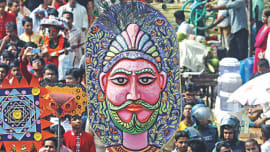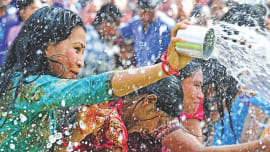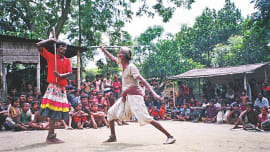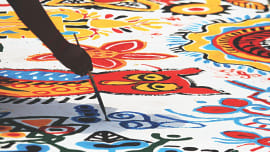Communalising culture
13 April 2017, 18:00 PM
A Celebration of Unity
The many shades of Boisabi
13 April 2017, 18:00 PM
A Celebration of Unity
A playful affair
13 April 2017, 18:00 PM
A Celebration of Unity
The power of tolerance over bigotry
13 April 2017, 18:00 PM
A Celebration of Unity
A festivity of syncretic traditions
13 April 2017, 18:00 PM
A Celebration of Unity
Communalising culture
In school, we were made to memorise definitions of culture and civilisation, marking a relationship between the two.
13 April 2017, 18:00 PM
The many shades of Boisabi
Pahela Baishakh is perhaps the sole festival that comes in every Bengali's life with a call to link the past with the present and welcome the New Year with rapturous rhythms of rejuvenation, vibrant colours and new hope. The time-honoured Bengali spirit of festivity and frolic is renewed again to hail the Bangla New Year 1424.
13 April 2017, 18:00 PM
A playful affair
The first day of the Bangla New Year is mostly when lathikhela (stick dance and fight) is organised in rural areas. Nowadays, lathikhela
13 April 2017, 18:00 PM
The power of tolerance over bigotry
In the recent past, religious fundamentalists issued a fatwa against Pahela Baishakh celebrations, which is an integral part of our cultural heritage. Some even went to the extent of terming the celebrations haram. For a nation that has always cherished liberal religious beliefs, what could be the implications of such religious bigotry?
13 April 2017, 18:00 PM
A festivity of syncretic traditions
Pahela Baishakh is not only the country's largest secular festival but also part of a global celebration. It's part of a universal festivity of the New Year across different cultures and religions.
13 April 2017, 18:00 PM









